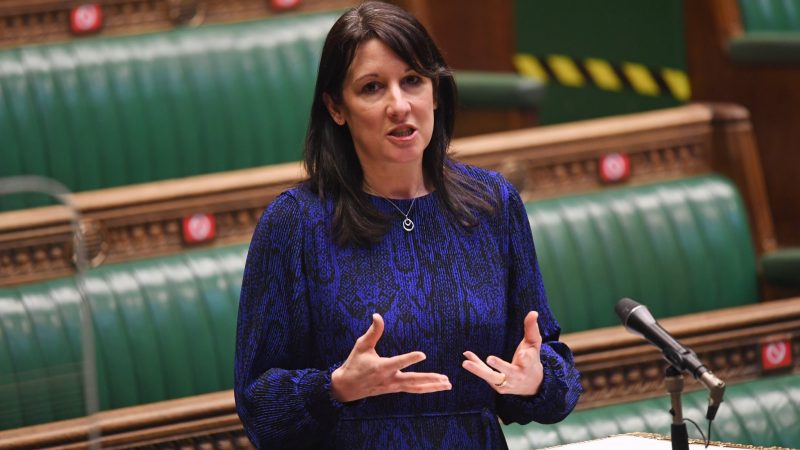
Rachel Reeves has declared that Labour will “buy, make and sell more in Scotland” as part of its plan to award more public contracts to British businesses and create “jobs of the future” as the UK recovers from the pandemic.
In her first major intervention in Scottish politics since being appointed Shadow Chancellor, and following the unveiling of the UK-wide economic plan earlier this month, Reeves described how the proposals would benefit Scotland.
The country has a “chance to seize new opportunities and shape a new future for Scotland and the rest of Britain”, she said, adding that Scotland has for too long “not had a government fighting to deliver jobs and growth”.
“121,000 Scots are unemployed, thousands of jobs in renewable energy have been lost and the country’s manufacturing base has been hollowed out,” Reeves said.
“Only Labour will get our economy firing on all cylinders by giving people new skills for the jobs of the future here in Scotland, bringing security and resilience back to our economy and public services, and helping our high streets thrive again.
“That starts with our plan to buy, make and sell more in Scotland and the rest of Britain. From green jobs in manufacturing electric vehicles and offshore wind turbines, to fin tech, digital media and film, we must grow modern industries to build a long-term economy that provides good jobs and is built for the future.”
Pointing to insecure supply chains exposed by shortages in equipment during the pandemic, Reeves said Labour’s proposals will seize long-term opportunities post-Brexit and post-pandemic, especially in green and tech industries.
The Scottish public sector currently spends around £11bn each year on goods and services, but the Scottish Labour Party has highlighted that less than 1% of small-and-medium sized businesses benefit from this public procurement spend.
Scottish Labour has called for a ‘local-first’ approach to spending, accompanied by a ‘Better Business Pledge’ requiring all businesses benefitting from public procurement to commit to paying the Scottish living wage, collective bargaining and not using zero-hours contracts and other insecure workplace practices.
The party has also proposed a ‘Scottish Energy Development Agency’ to coordinate the growth in renewable energy production, including in terms of skills and training, and make sure that green supply chain jobs are retained in Scotland.
Reeves unveiled Labour’s plan to “make, sell and buy more in Britain” earlier this month, declaring that “post-pandemic and post-Brexit, we should be rethinking how we support our businesses, strengthen our supply chains and give people the skills they need to succeed”.
The party is proposing the following:
- “Asking every public body to give more contracts to British firms big and small, using stretching social, environmental and labour clauses in contract design to raise standards and spend and make more in Britain;
- “Passing a law requiring public bodies to report on how much they are buying from British businesses including SMEs;
- “Leading a culture change in government, putting the growth of local industries first, and reviewing the pipeline of all major infrastructure projects to explore how to increase the materials made in Britain, upskill workers to get the jobs of the future;
- “Investing in reshoring jobs in the same way we invest in foreign direct investment, by helping every business considering reshoring access the expertise and support they need; and
- “Working with colleges and universities to make sure we’re honing the skills and apprenticeships for the jobs of the future.”
Labour has been critical of the UK government’s approach to public procurement. Lucy Powell accused ministers of “failing to back British steelmaking” earlier this year, after UK manufacturers missed out on £25m of funding for projects.
UK ministers have also been criticised over HS2, as only one UK-based firm was shortlisted for the £2.5bn track and tunnel systems contracts, and for their decision to award the post-Brexit passports contract to a Franco-Dutch company.
During the pandemic, the government prioritised buying much of the personal protective equipment supplies overseas. A firm from Cheshire, for example, had lined up a deal with local NHS trusts to provide 40,000 reusable gowns but it fell through as the government ordered a shipment from Turkey.
A National Audit Office report last year estimated that between February and July the government spent £12.5bn on PPE, five times as much as it would have cost in normal times, much of which was spent overseas rather than with British suppliers.




More from LabourList
‘Labour is being badly misled on housing’
Reeves bets on patience over populism
‘Energy efficiency changes must work for older private renters’